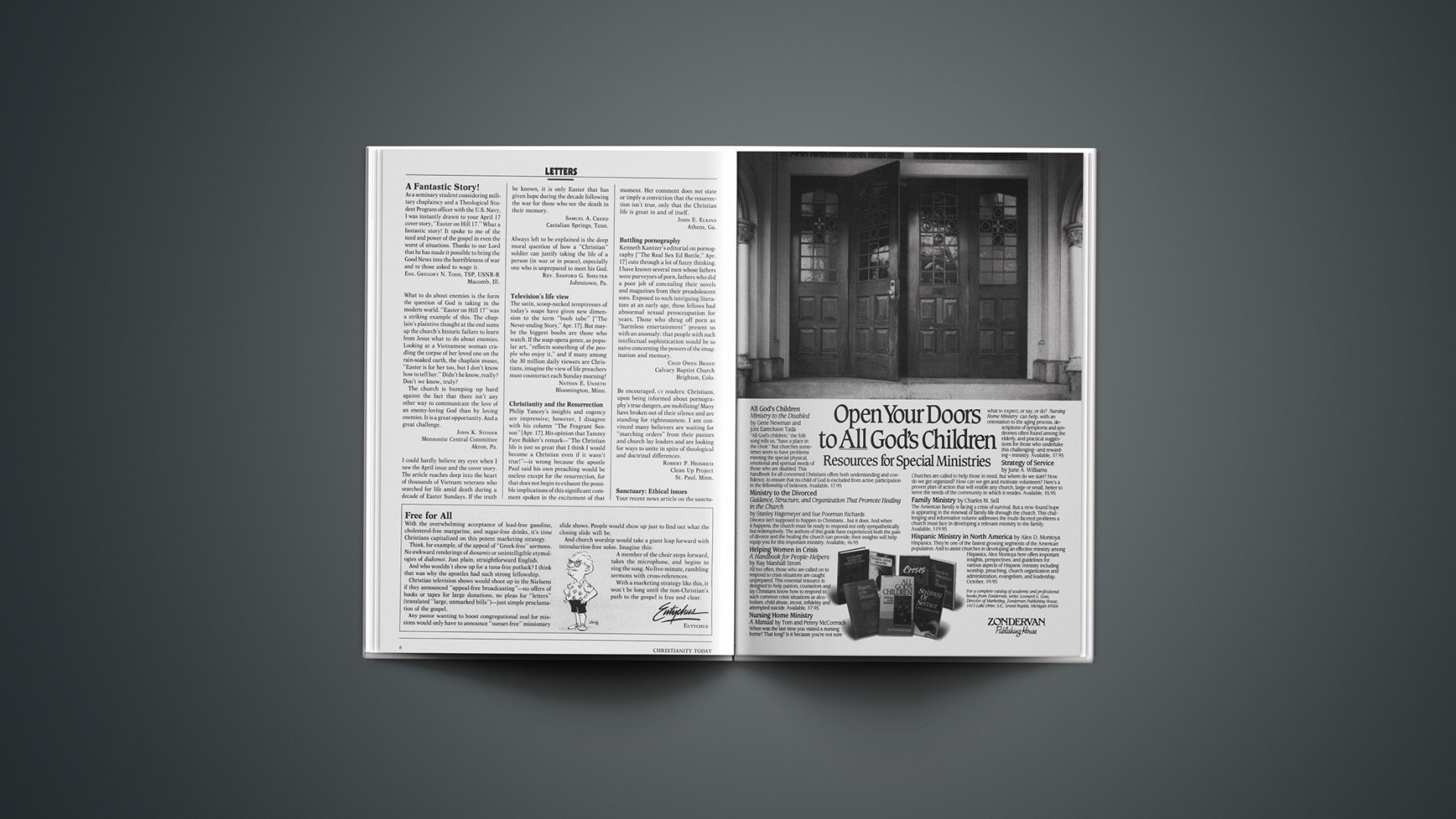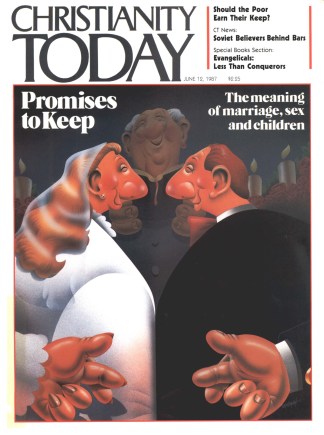A Fantastic Story!
As a seminary student considering military chaplaincy and a Theological Student Program officer with the U.S. Navy, I was instantly drawn to your April 17 cover story, “Easter on Hill 17. “What a fantastic story! It spoke to me of the need and power of the gospel in even the worst of situations. Thanks to our Lord that he has made it possible to bring the Good News into the horribleness of war and to those asked to wage it.
ENS. GREGORY N. TODD, TSP, USNR-R
Macomb, Ill.
What to do about enemies is the form the question of God is taking in the modern world. “Easter on Hill 17” was a striking example of this. The chaplain’s plaintive thought at the end sums up the church’s historic failure to learn from Jesus what to do about enemies. Looking at a Vietnamese woman cradling the corpse of her loved one on the rain-soaked earth, the chaplain muses, “Easter is for her too, but I don’t know how to tell her.” Didn’t he know, really? Don’t we know, truly?
The church is bumping up hard against the fact that there isn’t any other way to communicate the love of an enemy-loving God than by loving enemies. It is a great opportunity. And a great challenge.
JOHN K. STONER
Mennonite Central Committee
Akron, Pa.
I could hardly believe my eyes when I saw the April issue and the cover story. The article reaches deep into the heart of thousands of Vietnam veterans who searched for life amid death during a decade of Easter Sundays. If the truth be known, it is only Easter that has given hope during the decade following the war for those who see the death in their memory.
SAMUEL A. CREED
Castalian Springs, Tenn.
Always left to be explained is the deep moral question of how a “Christian” soldier can justify taking the life of a person (in war or in peace), especially one who is unprepared to meet his God.
REV. SANFORD G. SHELTER
Johnstown, Pa.
Television’s life view
The satin, scoop-necked temptresses of today’s soaps have given new dimension to the term “boob tube” [“The Never-ending Story,” Apr. 17]. But maybe the biggest boobs are those who watch. If the soap opera genre, as popular art, “reflects something of the people who enjoy it,” and if many among the 30 million daily viewers are Christians, imagine the view of life preachers must counteract each Sunday morning!
NATHAN E. UNSETH
Bloomington, Minn.
Christianity and the Resurrection
Philip Yancey’s insights and cogency are impressive; however, I disagree with his column “The Fragrant Season” [Apr. 17]. His opinion that Tammy Faye Bakker’s remark—“The Christian life is just so great that I think I would become a Christian even if it wasn’t true!”—is wrong because the apostle Paul said his own preaching would be useless except for the resurrection, for that does not begin to exhaust the possible implications of this significant comment spoken in the excitement of that moment. Her comment does not state or imply a conviction that the resurrection isn’t true, only that the Christian life is great in and of itself.
JOHN E. ELKINS
Athens, Ga.
Battling pornography
Kenneth Kantzer’s editorial on pornography [“The Real Sex Ed Battle,” Apr. 17] cuts through a lot of fuzzy thinking. I have known several men whose fathers were purveyors of porn, fathers who did a poor job of concealing their novels and magazines from their preadolescent sons. Exposed to such intriguing literature at an early age, these fellows had abnormal sexual preoccupation for years. Those who shrug off porn as “harmless entertainment” present us with an anomaly: that people with such intellectual sophistication would be so naïve concerning the powers of the imagination and memory.
CHAD OWEN BRAND
Calvary Baptist Church
Brighton, Colo.
Be encouraged, CT readers: Christians, upon being informed about pornography’s true dangers, are mobilizing! Many have broken out of their silence and are standing for righteousness. I am convinced many believers are waiting for “marching orders” from their pastors and church lay leaders and are looking for ways to unite in spite of theological and doctrinal differences.
ROBERT P. HEINRICH
Clean Up Project
St. Paul, Minn.
Free For All
With the overwhelming acceptance of lead-free gasoline, cholesterol-free margarine, and sugar-free drinks, it’s time Christians capitalized on this potent marketing strategy.
Think, for example, of the appeal of “Greek-free” sermons. No awkward renderings of dunamis or unintelligible etymologies of diakonoi. Just plain, straightforward English.
And who wouldn’t show up for a tuna-free potluck? I think that was why the apostles had such strong fellowship.
Christian television shows would shoot up in the Nielsens if they announced “appeal-free broadcasting”—no offers of books or tapes for large donations, no pleas for “letters” (translated “large, unmarked bills”)—just simple proclamation of the gospel.
Any pastor wanting to boost congregational zeal for missions would only have to announce “sunset-free” missionary slide shows. People would show up just to find out what the closing slide will be.
And church worship would take a giant leap forward with introduction-free solos. Imagine this:
A member of the choir steps forward, takes the microphone, and begins to sing the song. No five-minute, rambling sermons with cross-references.
With a marketing strategy like this, it won’t be long until the non-Christian’s path to the gospel is free and clear.
EUTYCHUS
Sanctuary: Ethical issues
Your recent news article on the sanctuary movement [“Charges of Break-ins and Infiltration,” Apr. 17] left many facts still unclear, but it did help me form a clearer picture of the ethical issues involved. If it is true that people’s lives are in danger—whether from persecution or extreme poverty—what is the difference between helping them and hiding escaped slaves or helping Jews flee the Nazi Holocaust? Do Latin Americans have less reason to value their lives or freedom than the rest of us? Can settled, middle-class Americans really understand their plight?
CRAIG S. KEENER
Springfield, Mo.
Setting the record straight
Christiano Brothers is based in Jonesboro, Arkansas, not St. Louis [Special Advertising Section, Apr. 17]. Also, I was credited with a quote by Jim Robinson of White Lion. Just want to keep the records straight.
DAVE CHRISTIANO
Christiano Brothers
Jonesboro, Ark.
Having babies
Thanks for the thoughtful editorial “How Not to Have a Baby” [Apr. 3], To a great extent, it tracked the Vatican’s position on these perplexing ethical questions. Couldn’t the evangelical community work with American Catholics and produce a statement that would act as a guide for all puzzled Christians who are faced with these kinds of decisions?
ELSIE DAVIDSON
Macomb, Ill.
Your editorial fails to address the main biblical Christian argument against surrogate motherhood: that it is technically nothing other than adultery, and therefore forbidden to Christians!
REV. LAURENCE R. WALTON
Exodus Prison Ministries, Inc.
Santa Clara, Calif.
Living in two worlds
I am grateful for your article “Cease-Fire in the Laboratory” [Apr. 3]. I am an academic psychiatrist, not a scientist, but I share many of the feelings of living in two worlds: working in a world that supplies its own reasons for its existence; of reluctance to think reflectively about the philosophical assumptions of psychiatry; and of bemusement when coming under fire from Christians for what they perceive to be conflicts between Christianity and my profession. By and large, my needs may not be very different from other people’s, but the gap (not conflict) in me between my faith and my profession is not one that will be bridged by the church, at least not in the foreseeable future.
L. K. GEORGE HSU, M.D.
University of Pittsburgh
Pittsburgh, Pa.
Why the “cease-fire”? Since I am a scientist, I suggest it is because those interviewed were scientists first rather than Christians first. They viewed the Bible through the eyes of evolution, and not evolution theory through the eyes of Scripture. Let us learn to make our “scientific views” subservient to Scripture. Let us be Christians believing revealed truth (Bible) first, and proposed theories (evolutionary science) second.
DENNIS FREIDEL, PH.D.
Fort Collins, Colo.
It isn’t surprising Stafford interviewed mainly theistic evolutionists, who are happy with their position. If they rarely discuss Christianity and accept the origins dogma taught them, there will be little conflict. Those who do not abide by this either have great difficulty or are no longer found at the university.
MICHAEL J. OARD, M.S.
Great Falls, Mont.
“Pseudo-Christianity”
Bravo to Charles Colson for saying health-and-wealth theology is false theology [“My Cancer and the Good Health Gospel,” Apr. 3], We need more Christian leaders to denounce this pseudo-Christianity.
G. DEWAYNE MEADOWS
Percy, Ill.
While I agree we come to Christ “not because of what he may do to spare us from suffering, but because Christ is truth,” the Bible is bursting with stories of divine healing. Evangelicals seem not only to lack a theology of healing, but a practice of it. Did it ever dawn on Colson that he could ask God to heal him?
REV. RODNEY E. LAYMAN
First Baptist Church
Lindsay, Calif.
Episcopal morality
In your news articles on the Episcopal Church’s “Battle Over Sexual Morals,” [Apr. 3] you have failed to mention the church’s last official statement from the General Convention:
“We reaffirm the tradition teaching of the church on marriage, marital fidelity and sexual chastity as the standard of Christian sexual morality. Candidates for ordination are expected to conform to this standard. Therefore, we believe it isn’t appropriate for this church to ordain a practicing homosexual, or any person who is engaged in heterosexual relations outside of marriage.”
You also misinterpreted the 1985 resolution that was “narrowly defeated.” That resolution stated no one should be “denied access to the selection process” for ordination on the basis of sexual orientation, race, gender, age, or physical handicap.
The Diocese of Newark’s report is receiving far more attention in the church press than serious consideration by Episcopalians, I believe. The mood of the Episcopal Church, as I see it, is decidedly against any change in its current official position on sexual morality.
DAVID E. SUMNER
Knoxville, Tenn.










